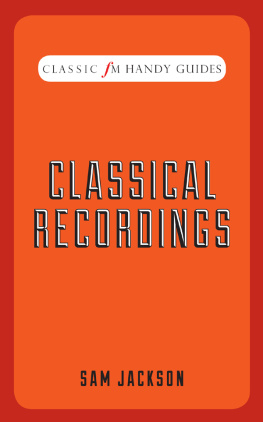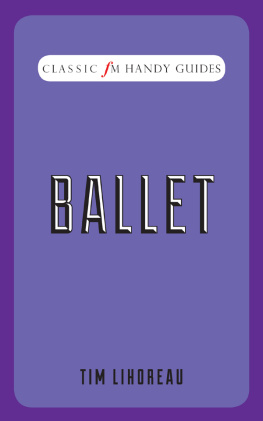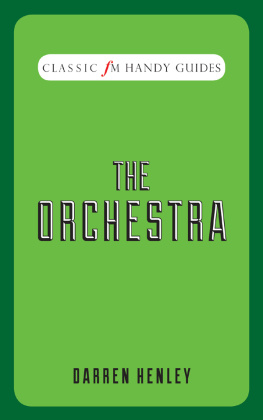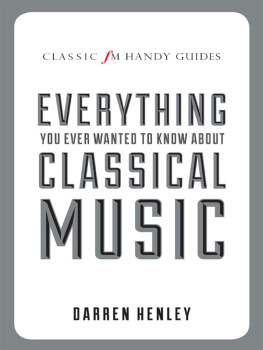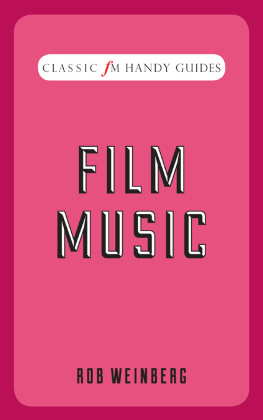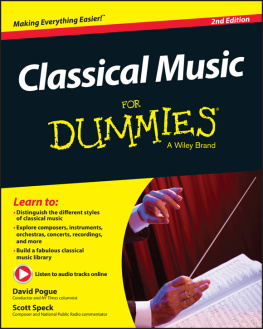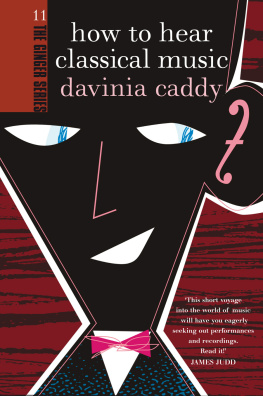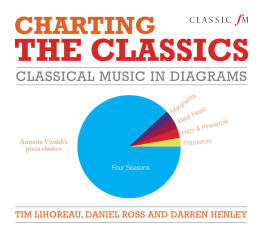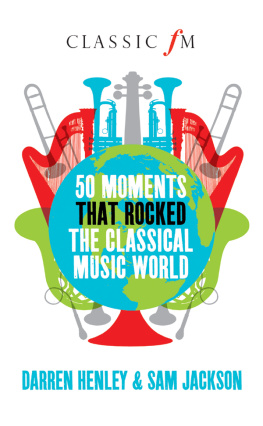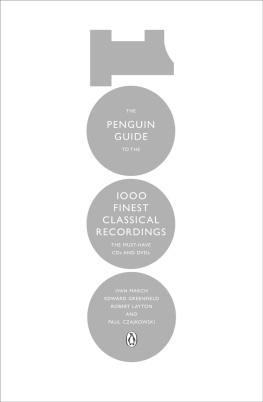CLASSICAL
RECORDINGS

Contents
Introduction
A t Classic FM, we spend a lot of our time dreaming up wonderful ways of making sure that as many people as possible across the UK have the opportunity to listen to classical music. As the nations biggest classical music radio station, we feel that we have a responsibility to share the worlds greatest music as widely as we can.
Over the years, we have written a variety of classical music books in all sorts of shapes and sizes. But we have never put together a series of books quite like this.
This set of books covers a whole range of aspects of classical music. They are all written in Classic FMs friendly, accessible style and you can rest assured that they are packed full of facts about classical music. Read separately, each book gives you a handy snapshot of a particular subject area. Added together, the series combines to offer a more detailed insight into the full story of classical music. Along the way, we shall be paying particular attention to some of the key composers whose music we play most often on the radio station, as well as examining many of classical musics subgenres.
These books are relatively small in size, so they are not going to be encyclopedic in their level of detail; there are other books out there that do that much better than we could ever hope to. Instead, they are intended to be enjoyable introductory guides that will be particularly useful to listeners who are beginning their voyage of discovery through the rich and exciting world of classical music. Drawing on the research we have undertaken for many of our previous Classic FM books, they concentrate on information rather than theory because we want to make this series of books attractive and inviting to readers who are not necessarily familiar with the more complex aspects of musicology.
For more information on this series, take a look at our website: www.ClassicFM.com/handyguides.
Preface
I n the world of pop and rock, buying music is a fairly simple affair. Lets say youre a fan of Katy Perry or Arctic Monkeys: you simply download the songs you love, or purchase a copy of their latest CD. The world of classical music, however, tends to be a more complicated affair. Imagine youve just heard Vaughan Williams The Lark Ascending for the very first time, and you want to get your hands on a copy. A quick search online will present you with enough CDs to fill your entire living room. Do you go for Nigel Kennedys long, languid version? Or Sarah Changs speedier (but arguably no less beautiful) performance? And then theres Tasmin Little, Janine Jansen and Julia Fischer to consider not to mention the fact that some of the recordings seem quite pricey, while others are cheaper than a cappuccino. In short: when it comes to buying classical music, where on earth do you start and how, exactly, do you discern whats good or bad?
This new pocket guide from Classic FM aims to set you on the right path towards building up a great classical music collection, whether thats in the form of physical CDs or a multitude of downloads. Over the next few pages, youll discover which classical record labels are worth your attention, before we then dive head first into the 100 Albums to Own. Based on The Classic FM Hall of Fame (also available from Elliott & Thompson), it focuses on the most popular classical repertoire and, each time, includes a suggestion of a great recording for you to purchase.
It goes without saying that any list like this is, by its very nature, subjective. You only have to read the critics to quickly see that one persons definition of success can sometimes be another persons turkey. But whether or not you agree with the choices, they should hopefully give you a starting point when it comes to what you should be spending your money on.
If you want to find out more about the best classical recordings, do join David Mellor every Saturday evening at 9 p.m. on Classic FM, for The New Releases Show. Every week, David picks a Best Bargain, a Young Artist to Watch, a Connoisseurs Choice and an Album of the Week, playing music from a wide range of the latest releases. Whats more, youll find pages of resources and suggestions on our website, ClassicFM.com just click on Discover at the top of the home page, and within a matter of moments youll be exploring a wealth of expert opinion.
Happy listening!
The Classical Labels That Matter
There are hundreds of classical record labels and its certainly the case that big doesnt always mean best. Having said that, if youre looking for a mark of quality, you can be sure that these very successful labels are nearly always home to recordings you can rely on. So, in alphabetical order, heres a rundown of the classical labels that matter.
Chandos
A family company based in Colchester, Chandos is known for championing esoteric repertoire alongside the more well-known names. The Chandos strapline is Serious about Classical Music, so you wont find many jazzy covers, jokey sleeve notes or controversial repertoire here. What you will find, though, is a label thats absolutely committed to a huge range of music, always performed to an extremely high standard.
Decca
The Decca label has had an intriguing and impressive history: as well as being home to the likes of Luciano Pavarotti and Alfred Brendel, it was also the label of choice for Billie Holiday, Louis Armstrong and the Rolling Stones, among others. Today, Decca exists in two distinct forms: Decca Classics (which, with its blue and red label, is home to mainstream classical artists such as the young pianist Benjamin Grosvenor and the conductor Riccardo Chailly) and Decca Records (the black-labelled other half of the company that includes crossover stars such as Katherine Jenkins and Alfie Boe).
Deutsche Grammophon
Deutsche Grammophon or DG as its referred to by many can lay claim to being not just the most important classical music label, but the most important label in the history of all recorded music. Founded in Hanover in 1898, Deutsche Grammophon was responsible for launching the worlds first record- and gramophone-manufacturing works. Well over a century later, DGs prestigious yellow label has become shorthand for excellence and quality.
Harmonia Mundi
Harmonia Mundi is the worlds oldest independent record label: since 1958, this French company has championed classical music in all its glorious forms. In particular, Harmonia Mundi is known for releasing Baroque music performed on period instruments, of the kind that Bach and Handel would have been familiar with. The label employs around 300 people worldwide; its founder, the much-loved Bernard Coutaz, died in 2010 and was succeeded by his daughter, Eva, who is now president of the company.
Hyperion
The success and appeal of the Hyperion label lies in its quirkiness, its originality, and its discovery of some of the most remarkable repertoire. The founding of the company is fairly idiosyncratic: it was the brainchild of a music-loving taxi driver called Ted Perry, who launched Hyperion in 1980. Perry had worked in record shops as a young man and he saw a gap in the market for enjoyable, well-packaged classical music that was not necessarily well known. Despite its extensive back catalogue and worldwide acclaim, Hyperion remains a family company: Teds son, Simon, now runs the business from an industrial estate in south-east London.
LSO Live
The London Symphony Orchestra is a world-class ensemble, admired across the globe for its outstanding music making. However, despite the fact that the LSO made their first recording all the way back in 1913, it wasnt until 2000 that they launched their own record label. LSO Live is home to some outstanding recordings: Valery Gergievs interpretations of Russian music, for example, and Sir Colin Daviss explorations of the music of Nielsen, Sibelius and Haydn. Whats more, LSO Live was one of the first classical labels to truly understand the importance of digital downloads, and it remains one of the most innovative and impressive outfits around.
Next page
